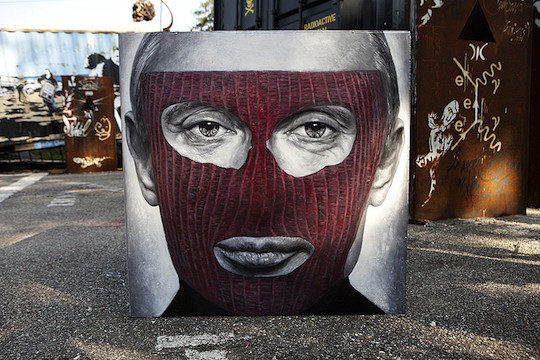This hell-bent play by what The New York Times has called “[t]he world’s most visible and lionized underground theater” keeps finding ways to pull the rug from under the feet of astonished audiences.
“It will not be his balls, but ours, behind the door,” a buffoonish technocrat rants to his doppelgänger, as the two leisurely defecate in their ministerial toilets, in unison. Moments later, the other one expounds on the evils of modern art: “Before Picasso, art was normal.” (As it turns out, he owns two of the deviant’s paintings.) When they finish shooting the shit, and shitting, they pull up their government-issued trousers to discover a lack of toilet paper. Following the pair’s exit, masked bandits inexplicably slip onto the stage to replenish the needed supplies in a sort of winking parenthetical—or, better still, a puckish middle finger.
These gag lines satirizing the absurdities and hypocrisies of dictatorships—specifically the Putin regime—are the sort of irreverent zingers that some of us relish: comedic relief with a reactionary backhand, using both shock and shtick to slice through inaction and fear. It’s a particular specialty of Burning Doors, performed by the UK-based Belarus Free Theatre, which celebrated its tenth anniversary last year despite being banned in its home country. Currently in the second staging of its UK tour at the Soho Theatre, one of London’s essential performing arts labs, the show is a wielding and warped montage of vignettes based on the testimonies of artists targeted by Putin. These include the Russian artist Petr Pavlensky, who nailed his own testicles, referenced above, to the cobblestones of Red Square; the Ukrainian filmmaker Oleg Sentsov, who is currently serving a twenty-year prison sentence in the Russian Far East; and the feminist punk rock group Pussy Riot’s Maria Alyokhina.
The play is performed in Russian and Belarusian with English subtitles, but much of the action requires no translation. Alyokhina, who plays herself in the show, was released from prison on amnesty three years ago, and during her highly publicized trial, she highlighted, perhaps intentionally, the court’s illegitimacy by refusing to engage with it—indeed, she made the act of turning her back to the court’s video camera an artistic gesture of agitprop. Here, she joins the eight-strong (and muscular) cast in what becomes a string of incessant permutations of state torture methods, where the interchangeability between the oppressor and the oppressed is always present: a man sups deeply from a pail full of water in preparation to wet himself, while a noose, mid-air, is suspended above him; Alyokhina’s head is repeatedly dunked for long stretches in a brimming bathtub, and we marvel at her respiratory endurance; female inmates are given unnecessary gynecological exams; men are stripped naked. All this takes place in a sparse, square space in front of three anonymous prison doors.
In order to transmit the trauma experienced by Pavlensky, Sentsov, and Alyokhina, playwright Nicolai Khalezin also traumatizes the audience as far as one can within the legal parameters for public nudity and imitated abuse. As a result, the urgent threads of our subjects’ struggles can get lost in the riptide of relentless choreographed violence. At times, the play’s verbatim literary backbone—excerpts from Dostoevsky’s The Brothers Karamazov and Foucault’s Discipline and Punish—comes across as cut-and-paste. Still, the dialogue switches effortlessly between political lectures and hypnotic, infernal diatribes, and the group’s commitment to exposing widespread, state-instituted violations against human rights in Belarus, Russia, and the Ukraine is evident throughout. Burning Doors recreates the experiences of real people whose lives are at risk and is performed by a company that puts its members—and their families—in danger by bringing these stories to the international stage. They have the confidence to show awful things as honestly as they can, always toeing the legal line. And Burning Doors, like all of Belarus Free Theatre’s projects, is both necessary and original.
While all the characters felt richly iconoclastic, Alyokhina’s célébrité, in particular, allowed her to serve as a mouthpiece. This is not a bad thing. Taking her place center stage for a barefaced Q&A with the audience before the play’s final scenes, Alyokhina proved herself as the show’s headliner, as an activist, as a survivor of torture, and as a brand, which seemed not just inevitable but constructive—an outcome that compensated for any jarring incoherence in the show’s plot. She was a perfect avatar for one of Belarus Free Theatre’s aims: to “create a space where audiences understand that there is a place where people aren’t afraid to talk honestly about themselves and what is happening around them.” The questions were not particularly illuminating, but perhaps, by then, we were an emotionally worn-out bunch. One audience member asked, “Do you believe that there will ever be freedom in Russia?” Alyokhina, who had been drowning in a bathtub only half an hour before, treated the question with some incredulity—if the message of Burning Doors isn’t motivated by a call for change, what were her exertions for in the first place? But she answered firmly, “I believe in it.” If Alyokhina is as much a symbol of a revolution as a person, perhaps her conviction—clearly shared by Belarus Free Theatre—is the major takeaway.
UK Performances
28–29 Sep: Space Studios, Dartington
1 Oct: AMATA, Falmouth University
10–12 Oct: Contact, Manchester
12 Oct: World-wide free livestream
14 Oct: New Theatre Royal, Portsmouth
International Performances
21–22 Oct: VIE Festival, Modena, Italy
29 Nov–3 Dec: Arts Centre Melbourne
M. René Bradshaw is a Californian-born writer, culture critic, and translator based in London. She is the UK Editor-at-Large for Asymptote.
*****
Read About More Events:

